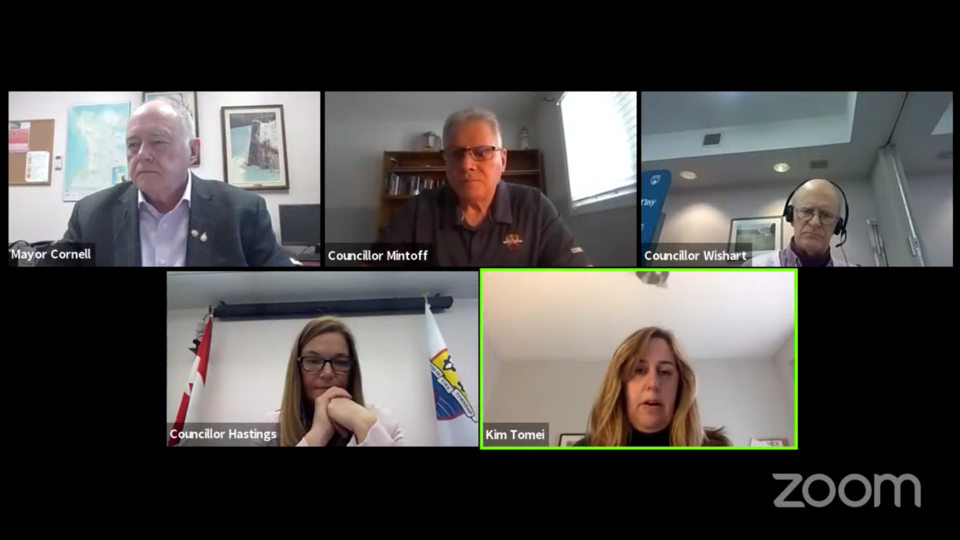A simple driveway repair project led to a fiery $1,000 invoice from the fire department for one Tiny resident.
Kim Tomei and her husband Larry, who recently bought property in the township, were having minor repairs done to their driveway last summer when a gas line break led to the fire department being called out to the location.
Five months later, the couple received a cost-recovery invoice for the service.
"We found that $1,000 for this is an extreme amount, in our opinion," Kim Tomei told council this week. "We understand we need to support the fire department and we have no issues with that. We completely support that. We felt that those things would be more included in our taxes."
She said she spoke with Enbridge immediately following the incident, and based on the location and the placement of the gas line, they did not find that the residents were at fault.
"What we found was that the gas line was less than one foot below the ground," Tomei added. "They did not charge us or find that we were at fault based on the work we were doing."
She said to demonstrate the simplicity of the work being done, she had sent a photo to Coun. Tony Mintoff.
He, however, had managed to obtain other photos taken at the scene indicating it wasn't just a shovel-in-the-ground project.
"There was a bobcat there doing some digging operations," said Mintoff. "Did you have a contractor working on that site at the time?"
He also asked if she was familiar with the provincial One Call program. The service exists for residents, contractors and municipalities to help identify spots where services, such as gas and electricity are located underground.
Tomei said she wasn't aware of the service before this and that the work was being done by a close family friend, so One Call wasn't discussed.
"We have done work here at home, (when I lived) in Woodbridge," she said. "We did our driveway last year and there was never a need for any marking at all. When we came to do it up in Tiny, it was never a thought for me."
Mintoff said he could see how she may not have been aware of the program or to check with them.
"But perhaps somebody who owns that (bobcat) and uses it for gainful employment should have known," he added. "It seems to me that the concern you have should be promoted toward the person who caused the break as opposed to the fire department that had to respond."
When MidlandToday reached out to Fire Chief Dave Flewelling he provided information regarding the fire department's role in the call.
He said when a gas line is struck during digging, the person would typically call the service provider. Then they would either call 911 or ask the caller to do so.
"Then the fire department will secure the area, block traffic if necessary, and advise neighbouring property owners to close their doors and windows and stay inside," said Flewelling, adding he wasn't at the call so he couldn't comment on the extent of the leak.
However, speaking to protocol, he said, it all depends on the size of the line that was struck.
"No matter what line is struck, you have escaping gas, which is in the atmosphere," said Flewelling. "If it's a windy day, typically, the gas will dissipate. If the break is below grade and there's still dirt on top of it, it can migrate underground and it likes to find low spaces, like basements."
In such cases, he said, the municipality has a cost-recovery bylaw that applies. The bylaw, available online, outlines that in case of an environmental service call, the fire department will charge $500 per vehicle for the first hour and $250 per vehicle for continued service at half-hour increments.
"(One Call) would come out or send someone and mark all the services in that area," said Flewelling. "They would de-mark where the hydro lines would be coming into the residence so you can safely hand dig around those areas instead of using machinery so they aren't inadvertently struck."
One Call's service provides the user with documentation, along with the location of these services, he said.
"Part of the rules is you're not allowed to use machinery in that area," said Flewelling. "You use a tool that doesn't pierce the line and (dig) within one metre of where they've marked the line until you find it and expose it all along to ensure you don't damage it."
At the meeting, Coun. Gibb Wishart, however, had another possible solution for the Tomei's financial recovery.
"When you purchase a property, typically, you buy an insurance policy that covers unforeseen situations on the property that the seller didn't inform you about," he said. "Just as a point of interest, gas has to be buried 24 inches below (ground) and this is something that you weren't informed about. Your insurance policy should cover the costs of dealing with this. I would be investigating that."
Tomei said she would look into that at her end as council asked Flewelling to come back at a next meeting with more information around the situation.



